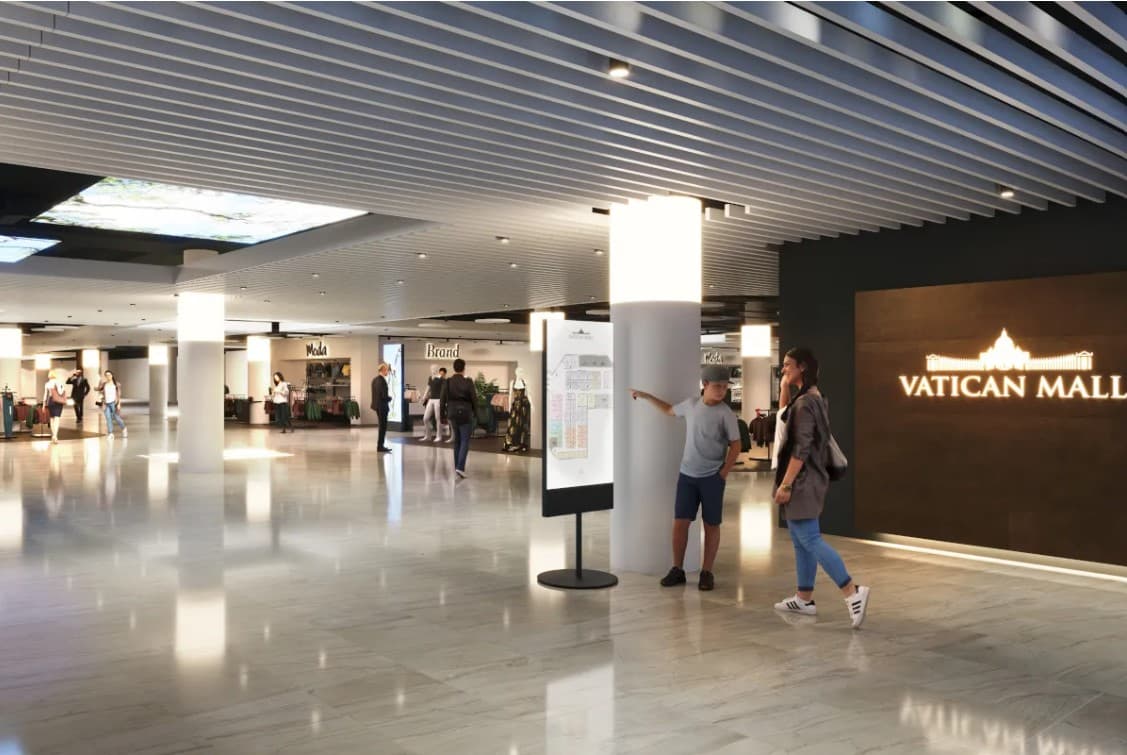ROME – Perhaps it was inevitable that the most storied church in Christendom eventually would be flanked by a chapel to that other defining Western creed, consumerism. Fulfilling that bit of destiny, the Vatican opened its very own shopping mall on March 16, located immediately adjacent to St. Peter’s Square.
The idea behind the new 120,000 square foot “Caput Mundi” Mall, using a traditional saying about Rome as the “capital of the world,” is to appeal not only to the four million visitors who move through the Vatican every year, but also the 35 million tourists and pilgrims expected for the Jubilee Year in 2025.
Ironically, the mall is located in a space associated with the last great jubilee. It occupies the fifth and top floor of a massive parking garage on Rome’s Janiculum Hill built for the Jubilee Year of 2000, and has been in the works since 2020. The space was previously devoted to a coffee bar and cafeteria for the busloads of tourists and pilgrims who arrive in the parking structure.
Though it may seem ironic that the Vatican should be launching its own shopping mall under a pope who’s a stern critic of the excesses of capitalism, there are some distinctive “Pope Francis” touches, including an emphasis on sustainability and solidarity.
For instance, among the 40 stores in the new retail space is the Turin-based company Canna di Bambu, which markets bamboo products made with recycled plastics collected from the world’s oceans, and which also collaborates with a fashion brand called “Made in Prison” that gives work to inmates.
There’s also a store for a company called Corium, based in Italy’s chronically under-developed southern region of Campania, which sells products made of regenerated scrap leather. There’s also an outlet for Ethic-all, an Italian service that allows shoppers to make donations to various good causes while they check out.
The mall is also designed with children in mind, featuring an ample play space, small robot puppies to welcome children, and also various services linking the mall with the nearby papally-sponsored Bambino Gesù pediatric hospital.
In addition, there are also outlets in the mall offering religious and spiritually themed products, including a California-based jewelry brand called “Amen” which sells scented candles named for saints and which, when the candle burns down, reveals a jewel at the center. A portion of the profits from its sales go to support a children’s hospital.
In addition, the mall will also have more traditional shopping and dining outlets, including the Rome debut of a sushi and pastry shop called Basara which has already proven highly popular in Milan.
The interior of the new mall features a cross-section of works of contemporary art, including five original pieces by Andy Warhol.
Caput Mundi has three entrances, including one off the broad Via della Conciliazione which leads up to St. Peter’s Square and is the main artery for people arriving to visit the Vatican. The parking structure in which the mall is located is administered by the Vatican’s Dicastery for Evangelization, which leased the space to a Rome-based firm called Gasak. The company says it invested roughly $10 million developing the shopping center.
A spokesperson for Gasak said the mall should become “one of the most important points of reference for shopping in the center of Rome, a boutique experience where the user feels he or she’s at the capital of the world.”
Although a March 16 opening ceremony for Caput Mundi drew a cross-section of Roman civic leaders and also Vatican officials, the project has drawn criticism from shop owners in nearby neighborhoods who worry it will siphon off their customer base. Some Roman media have also complained that the Vatican appears to be capitalizing on a structure which was built a quarter-century ago with public funds to relieve the press of traffic and parking in the area, not to host a commercial space.














